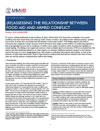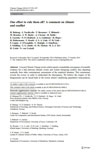-
Crunching the Numbers on Climate Change, Conflict, and Food Aid
December 31, 2014 By Sarah Meyerhoff Two studies push back on recent analyses that claim to demonstrate empirical links between food aid and conflict and climate change and conflict.
Two studies push back on recent analyses that claim to demonstrate empirical links between food aid and conflict and climate change and conflict.This summer, Nathan Nunn and Nancy Qiang argued in a co-authored paper that food aid, susceptible to theft by rebel groups, tends to extend the duration of intrastate conflict. But a USAID technical brief published in October disputes their analysis. Scholars at the University of Maryland’s Center for International Development and Conflict Management replicated Nunn and Qiang’s analysis, but made two key modifications: first, they excluded several years for which wheat data is spotty (1971 to 1974), and second, they included a number of omitted variables that could also play a significant role in prolonging or ending conflict, including domestic funding sources for rebels, ethnic grievances, spillovers from neighboring conflicts, and peacekeeping interventions. They found that the relationship between food aid and duration of conflict was not statistically significant with the first several years of data removed and that state-led support of rebel groups is a far more influential factor. The brief recommends that researchers explore the relationship between food aid and conflict with more disaggregated data, broken down by aid program and conflict, as well as the dynamics of state-rebel interactions.
 In a review article recently published in Climatic Change, a group of scholars dispute earlier findings that support a broad causal association between climate change and conflict. That paper, a meta-analysis of 50 quantitative studies on climate and conflict published a year ago in Science, argues that every increase by one standard deviation in temperature or rainfall produces an 11 percent change in the risk of intergroup fighting. However, writes Halvard Buhaug of the Peace Research Institute Oslo and more than two dozen colleagues, many of the studies that the meta-analysis draws on overlap, so the effect of climate is over-amplified. More significantly, they say, the types of conflicts studied and the roles climate impacts may play in them are too wide ranging to be compared. The authors performed an altered version of the meta-analysis, which supports the notion that the relationship between climate change and conflict is less conclusive. The lead author of the Science article, Solomon Hsiang, has since responded to the Buhaug’s rebuttal.
In a review article recently published in Climatic Change, a group of scholars dispute earlier findings that support a broad causal association between climate change and conflict. That paper, a meta-analysis of 50 quantitative studies on climate and conflict published a year ago in Science, argues that every increase by one standard deviation in temperature or rainfall produces an 11 percent change in the risk of intergroup fighting. However, writes Halvard Buhaug of the Peace Research Institute Oslo and more than two dozen colleagues, many of the studies that the meta-analysis draws on overlap, so the effect of climate is over-amplified. More significantly, they say, the types of conflicts studied and the roles climate impacts may play in them are too wide ranging to be compared. The authors performed an altered version of the meta-analysis, which supports the notion that the relationship between climate change and conflict is less conclusive. The lead author of the Science article, Solomon Hsiang, has since responded to the Buhaug’s rebuttal.Sources: Climatic Change, USAID.
 A Publication of the Stimson Center.
A Publication of the Stimson Center.








